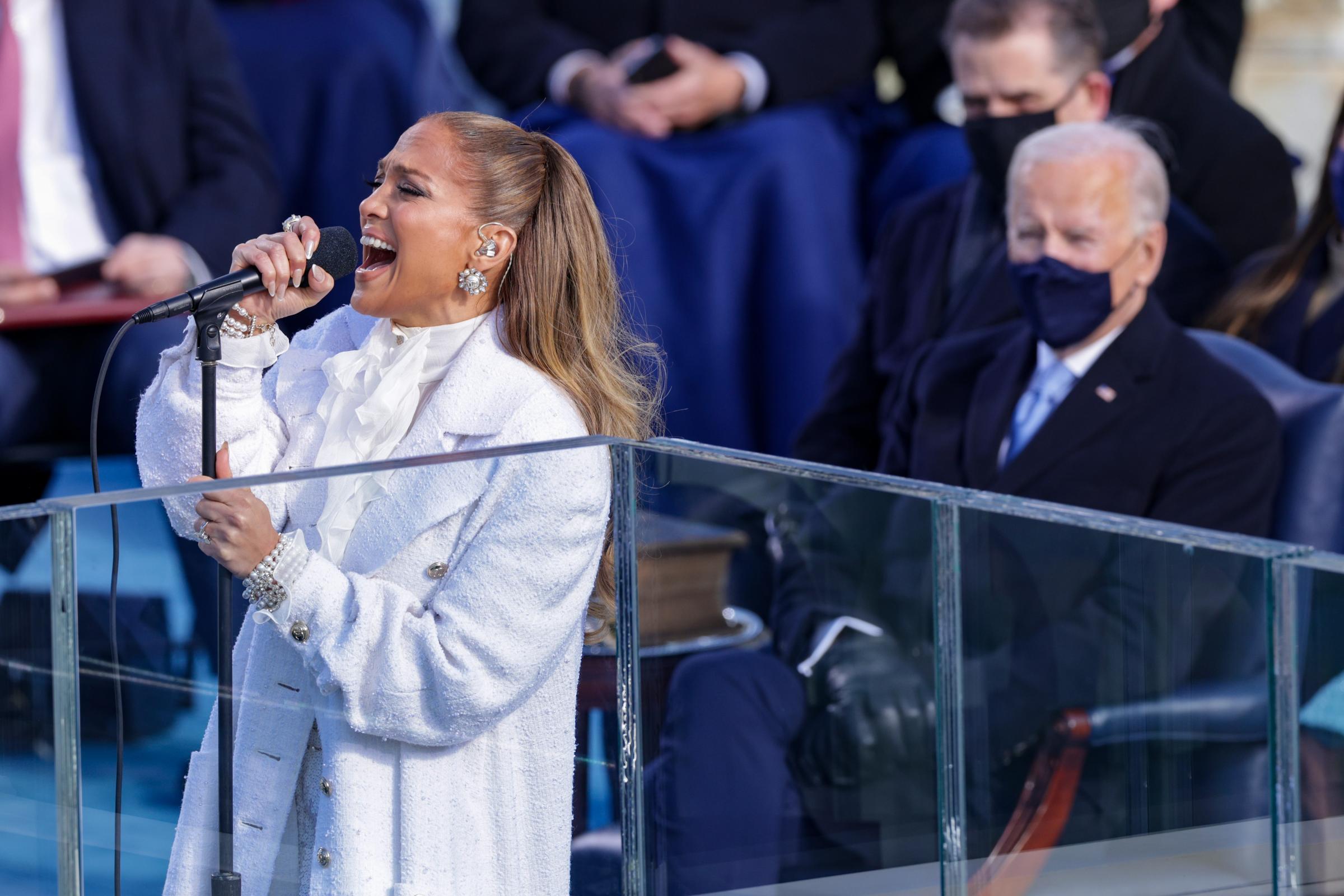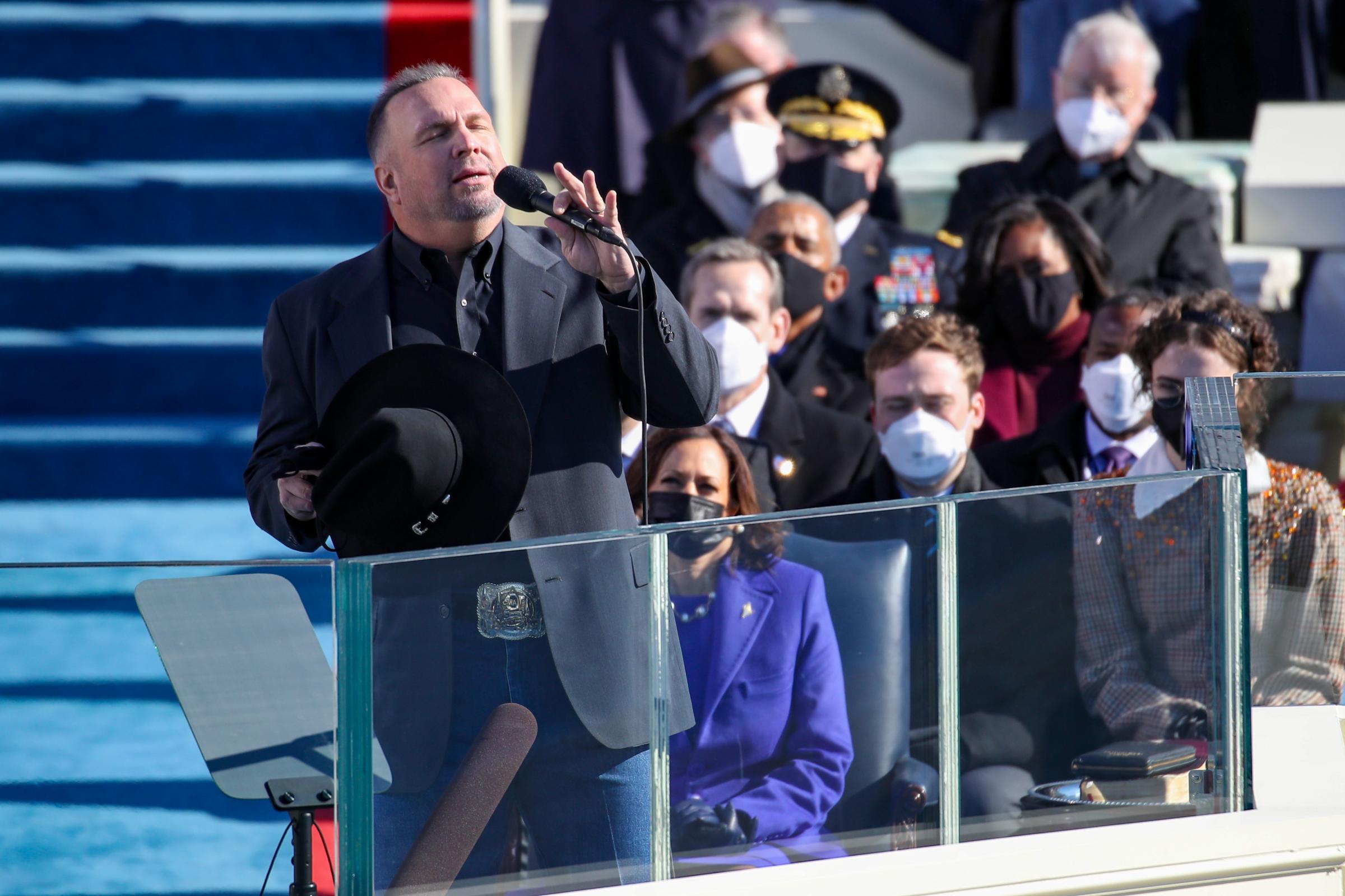When Lady Gaga, the first performer at the inauguration of President Joe Biden and Vice President Kamala Harris, stepped toward the podium to sing, everything about her—that tropical-red pouf of a skirt, the colossal golden dove perched on her shoulder, that milkmaid from MoMA hairdo—was a celebratory announcement: Welcome to the modern age! Though the road ahead is rocky, we no longer need to live in dread. Gaga, living completely in the moment, had arrived to point the way toward the future.
Inauguration musical performances, in their need to balance solemnity with jubilation, are always tricky propositions. But the Biden-Harris performances—from Gaga, J. Lo and Garth Brooks, performers from disparate backgrounds and different disciplines—struck a note unlike any we’ve previously heard. Let’s call it a sigh of relief building to a cheer of exaltation. Even the cloud-strewn blue of the Washington sky seemed keyed to the moment, and to this particular event, taking place in a spot where just two weeks ago a bunch of clumsy, if dangerous, insurrectionists took a run at democracy and failed.
Read more: Photographs From the Inauguration of Joe Biden and Kamala Harris
Jennifer Lopez was the centerpiece performer, but let’s talk about her first: emerging in all-white Chanel, she projected the confidence of a woman who has worked her way to the top of her game. White, as everyone likes to note, is one of the colors of the suffragettes, but it’s also the color of working people (in machine-washable cotton) and the color of luxury (in dry-clean-only silk and wool). In this remarkable high-low J. Lo outfit—replete with a snowy jabot, possibly a nod to the garb of our founding fathers—Lopez sang a remarkable song, “This Land Is Your Land.” It was written in 1940 by Woody Guthrie, allegedly in a shabby hotel room just outside of Times Square—not on the 6, but close enough.

For Lopez to sing this song—a protest anthem but also an irrefutable declaration of belonging—with so much conviction and boldness is to bring Guthrie’s intent and his dream full circle. This is an America he couldn’t have imagined, so terrible in some ways, yet so radiant in others. Here is where Woody in his work shirt meets a dazzling Latina artist from the Bronx who represents, not just in terms of any monetary success but in her sheer awesomeness, everything that an individual is free to strive toward in America. Lopez’s version of the song wasn’t a reclamation—you can’t reclaim something that already belongs to you. And as she segued into the song we sometimes think of as our second national anthem, “America the Beautiful,” she reaffirmed that sense of ownership and pride. In a breakout moment she shouted out, in Spanish, words that translate into “One nation under God, indivisible, with liberty and justice for all.” But you didn’t need to speak the language to know what she meant.
She was a tough act to follow, and the guy who drew the short straw was Garth Brooks. Sure enough, walking out stiffly in his pressed jeans and cowboy hat, how could he be, after the heroic glamour of J. Lo and Gaga, anything but a disappointment?
And then he began to sing, a version of “Amazing Grace” that he spun out with deep tenderness, as if he were holding a nest full of baby birds in his hands. Democracy, as the late John Lewis told us, is not a state but an act—it is something to be nurtured. Country music, Ray Charles and Charley Pride notwithstanding, is generally unfriendly to people of color, perhaps not by design but definitely out of habit. Yet it—like the blues, like jazz, like rock ’n’ roll—is part of who we are and where we’ve been. And to hear Brooks sing this song—its words written by a white clergyman, though it took on even greater power when it was adopted as a Black spiritual—with such care and modesty opened the door to a new world of possibility and hope. That he invited everyone—even those of us at home, which was most of us—to sing the final verse was yet another kind of reaching out. As Republican Senator Roy Blunt pointed out after the performance, it was hard not to recall another version of this song: the time Barack Obama, spontaneously and, with a capella bravery, launched into it during the funeral service for Reverend Clementa Pinckney, killed in the Charleston shooting of 2015. And now it became clear that when Brooks stepped up to the podium in his neat but ordinary clothes, his intention was seemingly to deflect attention from himself and draw it forward to the song itself. This was an act of humility.

All of this, of course, came late in the ceremony, after Lady Gaga had made her own offering to the proceedings, a cover version of the world’s most unsingable song, “The Star-Spangled Banner.” Damn this song! With its anti-democratic intervals, it’s not made for ordinary people to sing. But Gaga is no ordinary person. Those who are invited to sing at inaugurations—among the greatest of them were Marian Anderson and Aretha Franklin—are vested with a special responsibility. What would Gaga, in her gorgeous yet out-there Maison Schiaparelli outfit—an ensemble that, like J. Lo’s, reminded us that elegance with imagination is the best, maybe the only, kind—do with our weird but also oddly stirring national song?
The result was audacious and passionate and a little wild, as if the idea of patriotism (the true kind) had been beamed from Earth to Mars and back again, as a kind of test. Then she reached the line about Old Glory continuing to wave valiantly, having survived bloody battle and hardship—a line that should be corny, but that still stops my heart if it’s sung the right way. Just as she sang, “But our flag was still there,” she turned and, astonishingly, with a sweep of the arm straight out of Puccini or Verdi or Bizet, directed our attention to the actual flag. Her intent wasn’t just a subtext. It was a shout of jubilation and defiance. After all of this, our flag is still there! And how dare anyone even try to mess with it. Just two weeks ago, at this very site, a group of irritable, willfully misinformed self-styled militants sought to replace that flag with one emblazoned not with stars and stripes but with one man’s name. Angry at the sense that the world was moving beyond them, they had no idea that it had long ago moved past them. And now Lady Gaga sings not for them, but for us, for everybody who chooses, with fortitude and optimism, to move forward into the modern age, in our cowboy hats, our hard-won Chanel, and our shocking-raspberry ballgowns. Come as you are—but definitely come.
More Must-Reads from TIME
- Cybersecurity Experts Are Sounding the Alarm on DOGE
- Meet the 2025 Women of the Year
- The Harsh Truth About Disability Inclusion
- Why Do More Young Adults Have Cancer?
- Colman Domingo Leads With Radical Love
- How to Get Better at Doing Things Alone
- Michelle Zauner Stares Down the Darkness
Contact us at letters@time.com